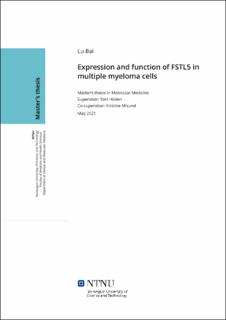| dc.description.abstract | Multiple myeloma (MM) is an incurable cancer arising in the antibody-producing plasma cells that are located in the bone marrow. The malignant cells disturb the balance between bone forming and bone degrading cells, leading to bone disease in most patients. Follistatin (FST) and its related follistatin-like (FSTL) molecules are antagonists of the transforming growth factor-β (TGF-β) family of proteins, which play important roles in the progression of MM. Recent studies showed that a member of FSTL molecules called FSTL5 was expressed in malignant myeloma cells but not in normal plasma cells and it had a prognostic value in MM. However, due to the limited knowledge of the function of FSTL5, its role in MM remains unknown. The aim of this thesis was to further explore FSTL5 expression in MM and try to learn more about its function.
The expression of FSTL5 mRNA in different cell types as well as a panel of human myeloma cell lines (HMCLs) was investigated. FSTL5 protein in HMCLs was detected by western blot using different antibodies that were raised towards different parts of the protein and FSTL5 gene knockout (KO) and knockdown (KD) strategies were applied to validate antibodies’ specificity. In addition, the effect of FSTL5 KO/KD on TGF-β family members and Myc inhibitor was examined and the role of FSTL5 in caspases activities was preliminary explored.
The results demonstrated FSTL5 mRNA expression in HMCLs and the existence of a new FSTL5 transcript variant, whereas FSTL5 protein expression in HMCLs was still undetermined. An antagonizing effect of FSTL5 on BMP and activins was not detected, no effect on cell viability was seen by FSTL5 KD, and no evidence of caspases regulation of FSTL5 was found. In conclusion, MM cells express a new FSTL5 transcript variant of unknown function. It would be of interest to investigate the function of this transcript variant and if it could have a role in the progression of MM. | |
